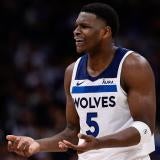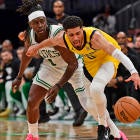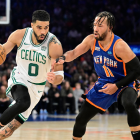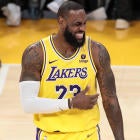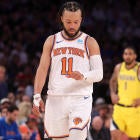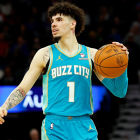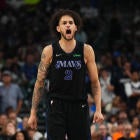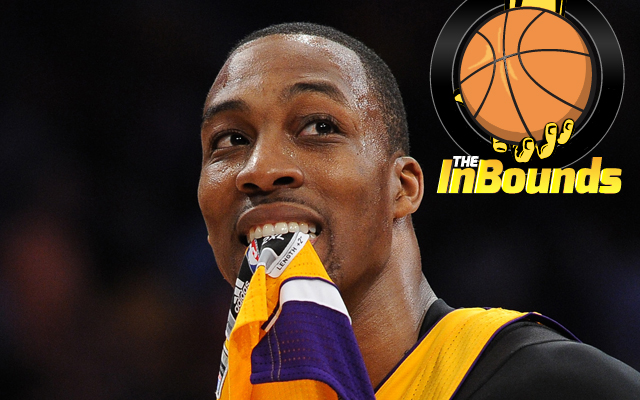
With free agency finally (mercifully) winding down, we look at five impact deals that have gone out in the first eight crazy days of the NBA summer of 2013.
1. Dwight Howard: Houston Rockets -- Four years, $88 million. I've said just about everything I think I can muster about Dwight Howard. I've debated his public character, his post game, his pick-and-roll prowess, his character, his image, his place as a cultural entity and place as an MVP candidate. I'm pretty much out of things to say about Dwight.
(Specifically, I wrote last Friday about how he fits with Houston.)
So if I have one final thing to say about Howard, it's a word of caution, in a novel of caution I've tried to impart about the big fella.
He can be successful in Houston. The decision to leave the Lakers can prove to be fruitful. He can reach the level he says he wants more than anything. But it will take the one thing he's resisted more than anything else, the very thing that was impossible in the gloss and flashbulb light of LA. He has to become self-aware. He has to realize what his mannerisms due to his teammates, whether that's frustrating them by being silly in serious moments, or encouraging in dark ones. He has to understand what they need from him, and how he looks from the outside.
It's difficult to have perspective in the NBA. Howard's been loved and doted on since he was in high school. But he's a man now, and one that's left a trail of destruction in the wake of his professional career. There are worse things to be, but Houston provides him a chance to move on from that. He needs to see himself from the outside and adjust his behavior accordingly. There's more in this world than just Dwight Howard, despite what the last two years have seemed like.
Oh yeah, and he needs to figure out he's twice as awesome in the pick and roll as he is in the post.
2. Paul Millsap: Hawks -- Two years, $19 million. You can argue Kyle Korver was unnecessary, at four years for a 32-year-old. You can definitely spin whatever decision they make in the backcourt as flawed (Brandon Jennings, Monta Ellis, either one = yikes). But when this deal came out, my brain spilled out of my head like someone dropped meatloaf on the floor.
Which way would you like me to go, metrics or feel? Because here's Josh Smith, who just landed that huge deal from Detroit, compared to Millsap's per-36 minutes numbers last year.
Millsap had a 19.8 PER compared to Smith's 17.7. Millsap had a 55 percent True Shooting percentage (factoring threes and free throws) compared to 50 percent for Smith. A higher rebounding percentage, a higher steal percentage, a lower turnover percentage, a smaller usage rate. 7.6 Win shares via Basketball-Reference.com vs. 4.2 for Smith.
This isn't a battle, it's a destruction, based on value.
But then there's the other side of it. Millsap's the guy who comes up with the gutty rebound, who knocks down the huge shot late when the defense breaks down, who plays within himself and above the competition. It's insane what Danny Ferry pulled off here, and pairing him with Al Horford works marvelously, no matter the misconception that Horford can't play the 5. (It's been six years, guys. He can play center.)
3. Josh Smith: Detroit Pistons -- Four years, $56 million. OK, so I just got done comparing Smith to Millsap and saying how much better Millsap is, so I have to trash this deal, right?
Not so much.
Look, sometimes a franchise doesn't want to slowly build a ladder out of a hole, rung by rung. It doesn't want to carefully build an incline. They just want to stick something sharp into the top of the hole and pull themselves out. The Pistons decided not to rebuild any further.
I can disagree with not being patient -- it's burned teams before, most notably the Pistons in 2009) -- but once you go this route, signing Smith to this deal isn't the worst option. Signing Monta Ellis to something with $15 million per year? That's a 2005-ish disaster move. Throwing your lot in by trading for Andrea Bargnani on his contract, or putting all your eggs in a J.R. Smith salad, those are the kind of deals that resemble decisions you make and then wake up the next day with a massive headache wondering where your pants are.
Because here's the thing. Smith has been disengaged in Atlanta for years. YEARS. Season after season, there were reports he had asked for a trade (politely), been frustrated that the team hadn't pushed him more for All-Star (they should have) and basically checked out.
You can say that a guy who does any of those things is not someone you want to trust your franchise with, or you can gamble that if you show him the appropriate love, he might hit that ceiling. The Pistons have young talent. Andre Drummond, Greg Monroe. And, despite The Dunk, Brandon Knight does have some skill. There's something here. So putting your chips behind a handful of Josh Smith's skill set isn't something I'm going to flip out over.
(But if this thing goes horribly wrong and is a rolling dumpster fire like it could be, let's not talk about this column, OK?)
4. Tyreke Evans: Pelicans -- Four years, $44 million. Here's the new formula for paying your backcourt/wing player who has shown any signs of life whatsoever coming off his rookie deal. Start at $14 million per year. Then subtract two million for any of these factors: age, injury, lack of a prolific season, malcontent attitude.
Voila. That's how you wind up with Evans making as much as Steph Curry, and Ty Lawson making more than them both. You pay the $10 million for the potential, $4 million for the ability, and then you subtract based on mitigating factors.
The extensions given to recent classes under the new CBA have me stuck on criticizing these deals. I thought giving Jrue Holiday between $41 and $46.5 million was insane. Then he played up to it. DeMar DeRozan, even more so. And while DeRozan wasn't close to Holiday, he looked like he might play into it eventually.
So you look at Evans and say, "What if he plays into this?" What if he embraces that Sixth Man role like he reportedly has? What if he becomes a secret weapon in key lineups? And was New Orleans going to get a significantly better player in free agency?
I'm still puzzled by it, just based on their apparent remaining love of Eric Gordon and my own reluctance to abandon the idea of Tyreke Evans: Point Forward Monster. But there are a lot of ways this works out, and only a few that it doesn't. Some of it's science, some of it is faith, but in truth, it may be the only thing the Pelicans could do.
5. Andre Iguodala: Warriors -- Four years, $48 million. Iguodala never asked to be traded to Denver, tried to embrace it, and by season's end had really started to buy in. The team was winning, he had grasped George Karl's idea that efficiency is defined by dunks, layups, 3s, and free throws and never mid-range jumpers. (Note: Ths is not an idea, it's a fact, but it's one that Karl is in rare company in embracing.) Ty Lawson was constantly working on him to return. He had developed a relationship with JaVale McGee and the other guys on the team.
The truth is that Iguodala might have returned to Denver if only two of the following three things had happened: The Warriors got insanely hot and burned the Nuggets to playoff cinders, Masai Ujiri left for Toronto, and George Karl was fired.
If the playoff loss had happened and Ujiri left, the team was the same and Karl would have been there to keep things going as they had been. If Ujiri and Karl were gone but the team hadn't lost in the first round, Iguodala would have seen the Nuggets as the best chance to win.
But all three things happened, and every concern Iguodala had about that team's ceiling hit hard -- and then was coupled by total anarchy in the offices.
Mark Jackson's preacher style probably appealed heavily to Iguodala. The California crowd going berserk probably appealed to him. And $48 million, a very healthy amount for a player who will be 33 when the deal expires, probably appealed as well.
Iguodala makes the Warriors better, just by overall value. He can defend. He can drive. He can kick. He can attack the basket and swallow up perimeter weapons, saving Steph Curry's energy to shoot from Montana more.
But Curry needs the ball in his hands to score. He actually does better shooting off the dribble than spot-up. Iguodala can't spot-up. So they're going to have to figure out that part. How he fits will be interesting, but, if nothing else, the Warriors can say they have All-Star talent at all four starting positions.
We tend to have short-term memories as sports fans. But let's remember the big picture when we wonder how Iguodala wound up on this Warriors team in a few years.












